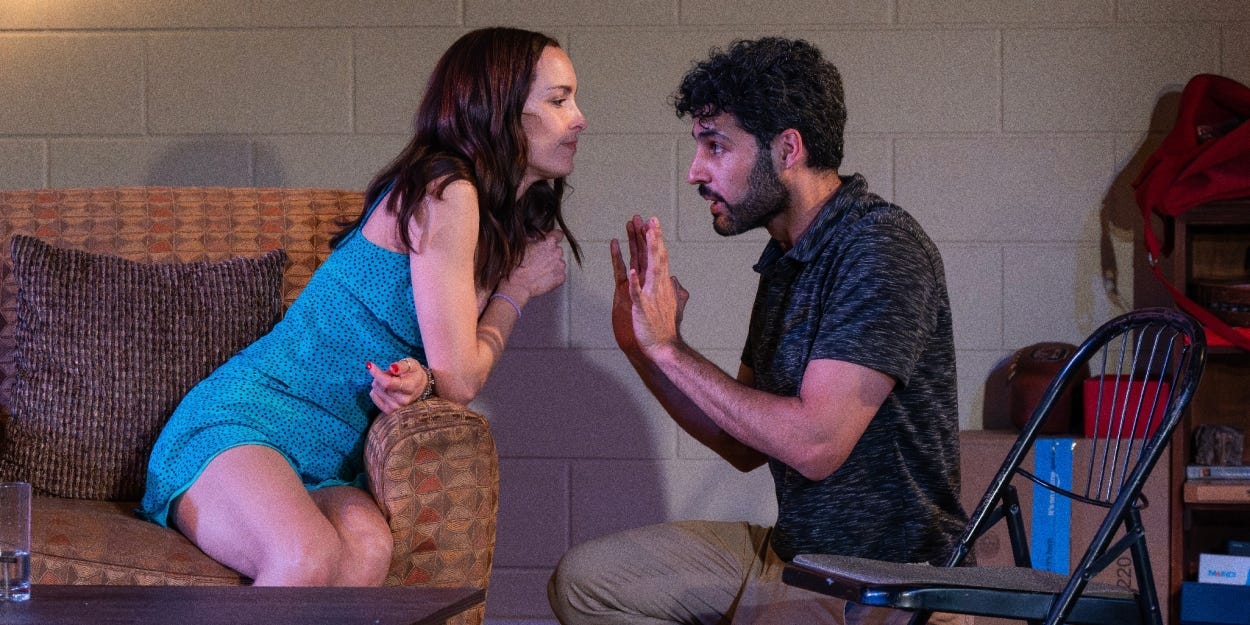Lowcountry (aka "Rotting Hill," "How To Ruse a Guy in 90 Minutes," and "'When Harry Met Sally' But Harry's a Sex Offender")
A Critwink from the Intelligent Showmosexual
Playwriting and screenwriting classes often teach the importance of thinking up an “elevator pitch.” To generate interest in your project and succinctly communicate its essence to those who haven’t yet read or seen it, you’re encouraged to use a sort of formula where you describe your new work as a cross between two known entities. For example, Kinky Boots could be pitched as The Full Monty meets La Cage Aux Folles.
When telling a friend about Lowcountry, I found myself lapsing into the language of elevator pitches and explaining it as “Frankie and Johnny in the Clair de Lune meets Dutchman or Job.” If you’re familiar with those plays, you might think it would be impossible to combine the poignant romance of the first with the sinister mind games of the second and third. Much of what makes Lowcountry entertaining is watching its creators frequently pull off that impossibility; conversely, much of what prevents it from achieving true greatness is its inability to do so consistently.
On their webpage, Atlantic Theater Company provides a summary that is—quite aptly—somewhat misleading: “When Tally, a down-and-out actress and gig worker, returns to her rural hometown, she swipes right on a disgraced high-school teacher fresh out of an ankle bracelet. Lowcountry is a dark, twisted romcom about the psychic distress of looking for love in the digital age and the carceral state.” Perhaps Atlantic’s marketing team chose to center Tally in their précis because the last few years have seen so many cries for more plays by and about women. While Lowcountry certainly ticks the first box, it is, in reality, more about David, the “disgraced high-school teacher” whose tenuous journey towards rehabilitation is thrown into chaos by Tally’s arrival for their first date.
The way these two wounded souls alternately connect and repel each other is reminiscent of Frankie and Johnny, right down to the repeated requests for one person to leave that go ignored. So does playwright Abby Rosebrock’s romanticization of trauma, which I do not mean to conflate with trivialization of trauma. Rather, like Terrence McNally before her, Rosebrock finds bittersweet beauty in David and Tally’s attraction to each other existing not in spite of their respective damage, but because of it.
At the same time, the secrets Rosebrock’s characters hide, and the efforts they make to provoke each other, recall—but also fall short of—the darker plays mentioned above. Though it’s a lot of fun to watch the narrative twists of Lowcountry unfurl, the play’s surprises are fairly predictable, depriving it of the sustained tension that kept me on the edge of my seat at Job. The double meaning of the play’s title reveals ambitions of being about more than David and Tally’s coupling, but the writing is at its least cogent and coherent when addressing larger social issues, especially around income inequality, and crime and punishment. Despite raising some genuinely interesting questions, Rosebrock’s social commentary is nowhere near as fully realized as Amiri Baraka’s in Dutchman; in fact, sometimes, it’s so muddled, it’s unclear whether it’s being presented seriously or in jest.
Ultimately, Lowcountry works best as a character study. As recognizable as David and Tally are as “types,” they are also continually interesting. They’re written and played with such empathy and honesty that, even when they behave problematically, we remain invested in their fates. It doesn’t hurt that much of their dialogue is legitimately funny. (A third character briefly appears, but is broadly drawn and mostly serves as a plot device.)
Jodi Balfour makes a meal of Tally in a performance that teeters on the fine line between heightened and over-the-top without ever inarguably crossing it. She is equally believable as an exposed nerve and a seductive manipulator. Babak Tafti is significantly more understated as David, perhaps in an effort to balance the production, but is compelling in his earnestness…and rocks a pair of black boxer briefs even better than the male lead in a Jamie Lloyd musical. With the crucial exception of her treatment of that third character, director Jo Bonney should be commended for her light touch and lack of judgement. Special mention should also be made of Arnulfo Maldonado’s thoughtfully realistic set design, a perfectly cheerless counterpart to all the dream homes John Lee Beatty has long presented on New York stages.
While leaving Lowcountry, I overheard some theatergoers discussing which of the three characters they hated most, speculating why Atlantic would produce a piece about such unsavory individuals. (Had I been inclined to pull a Julia Sugarbaker, I would have told them that their discomfort with the characters is exactly why they should be spending time with them…but it was Pride Weekend and I was feeling benevolent.) Others—including my friend Ava and I—imagined, with varying degrees of seriousness, what occurs after the curtain falls. In fact, everyone seemed to be talking about some aspect of the play, even if it was to share their own memories of a Bette Midler song that factors into the action. There was no talk of poor service at dinner or nannies that had to be relieved or even the oppressive NYC summer heat.
Even if Lowcountry never quite lives up its intentions of being an “issue play,” any work of theatre sparking that much discussion is worth seeing.
the not-a-bottom line
🌈🌈🌈(out of five)
a guide to ticket-buying
I got my Lowcountry tickets through my subscription to a papering service, which, in exchange for an annual membership fee and a request for discretion, supplies comps for a service fee of $5/ticket. My Saturday evening tickets were in row D center.
Don’t sit house right at Lowcountry, as part of the set may obstruct your sightlines.



